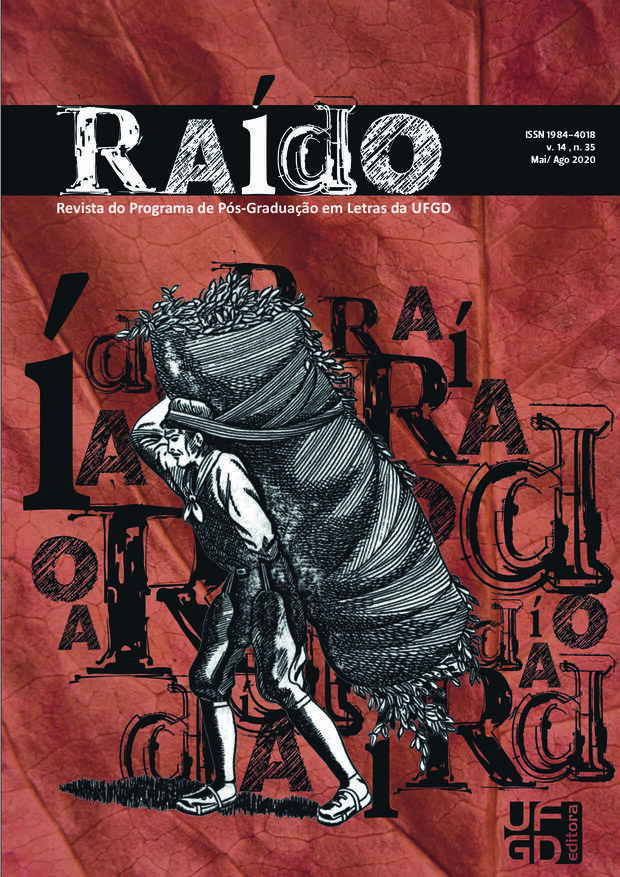The (re) writing of history in Wierzchowski's fiction: a study of the political and social aspects present in “The boy who ate a library”
DOI:
https://doi.org/10.30612/raido.v14i35.12163Keywords:
Politics and society. Literature authored by women. Leticia Wierzchowski. Second World War. Polish immigration.Abstract
The years that followed the second half of the twentieth century, from a literary perspective, contributed significantly to the emergence of fictional narratives of female authorship, whose themes detached, to a greater or lesser extent, from themes that had so far recurrent in this type of literary production, in a process in which the portrait of domestic reality started to give space to debates about political and social aspects. It is from this perspective that the present study aims to analyze the reflexes of the Second World War in the work entitled “The boy who ate a library” (2018), by the writer from Rio Grande do Sul Leticia Wierzchowski. Its fictional construction has, as one of its main characteristics, the representation of Polish immigration, as well as its memories and war traumas. Thus, in this study, we pay attention to the way the author approaches the political and social issues of the period in her fiction, breaking, at least in parts, with the characteristics and limitations imposed on literary narratives of content linked to feminism.Downloads
References
BERND, Zilá. Retraçando a memória da imigração polonesa no Rio Grande do Sul: uma leitura da obra de Leticia Wierzchowski a partir dos rastros. In: BERND, Zilá. Por uma estética dos vestígios memoriais: releitura da literatura contemporânea das Américas a partir dos rastros. Belo Horizonte: Fino Traço, 2013. p. 111-125.
GUIMARÃES, Josué. A ferro e fogo I e II. 10. ed. Porto Alegre: L&PM, 2008.
LOBO, Luiza. A literatura de autoria feminina na América Latina. Disponível em: http://lfilipe.tripod.com/LLobo.html. Acesso em: 27 de maio de 2020.
POZENATO, José Clemente. O quatrilho. 14. ed. Porto Alegre: Mercado Aberto, 1997. 211p.
SANTOS, Salete Rosa Pezzi dos. Mulheres que tecem a vida na tessitura de seu cotidiano. Raído, v.10, n.21, jan./jun. 2016. Disponível em: http://ojs.ufgd.edu.br/index.php/Raido/article/view/5209. Acesso em: 30 de maio de 2020.
TEDESCHI, Losandro Antonio. Os desafios da escrita feminina na história das mulheres. Raído, v.10, n.21, p. 153-164, jan./jun. 2016. Disponível em: http://ojs.ufgd.edu.br/index.php/Raido/article/view/5217. Acesso em: 30 de maio de 2020.
TOFANELO, Gabriela Fonseca. A importância da memória em romances de Leticia Wierzchowski. Palimpsesto. nº 27, Ano 17, p. 29 – 39, 2018. Disponível em: https://www.e-publicacoes.uerj.br/index.php/palimpsesto/article/view/38351/26855. Acesso em: 30 de meio de 2020.
WEBER, Regina. Uma ponte para Terebin. Métis: história & cultura. v. 7, n. 13, p. 319-322, jan./jun. 2008. Disponível em: http://www.ucs.br/etc/revistas/index.php/metis/article/view/707/513. Acesso em: 30 de maio de 2020.
WIERZCHOWSKI, Leticia. A casa das sete mulheres. 5.ed. Rio de Janeiro: Record, 2003. 511p.
WIERZCHOWSKI, Leticia. Cristal polonês. Rio de Janeiro: Record, 2003.
WIERZCHOWSKI, Leticia. O menino que comeu uma biblioteca. Rio de Janeiro: Bertrand Brasil, 2018.
WIERZCHOWSKI, Leticia. Os Getka. Rio de Janeiro: Record, 2010. Disponível em: https://docero.com.br/doc/xv5xv0. Acesso em: 30 de maio de 2020.
WIERZCHOWSKI, Leticia. Uma ponte para Terebin. 2.ed. Rio de Janeiro: Record, 2006.
Downloads
Published
How to Cite
Issue
Section
License
Os autores devem aceitar as normas de publicação ao submeterem a revista, bem como, concordam com os seguintes termos:
(a) O Conselho Editorial se reserva ao direito de efetuar, nos originais, alterações da Língua portuguesa para se manter o padrão culto da língua, respeitando, porém, o estilo dos autores.
(b) Autores mantém os direitos autorais e concedem à revista o direito de primeira publicação, com o trabalho simultaneamente licenciado sob a Atribuição-NãoComercial-CompartilhaIgual 3.0 Brasil (CC BY-NC-SA 3.0 BR) que permite: Compartilhar — copiar e redistribuir o material em qualquer suporte ou formato e Adaptar — remixar, transformar, e criar a partir do material. A CC BY-NC-SA 3.0 BR considera os termos seguintes:
- Atribuição — Você deve dar o crédito apropriado, prover um link para a licença e indicar se mudanças foram feitas. Você deve fazê-lo em qualquer circunstância razoável, mas de nenhuma maneira que sugira que o licenciante apoia você ou o seu uso.
- NãoComercial — Você não pode usar o material para fins comerciais.
- CompartilhaIgual — Se você remixar, transformar, ou criar a partir do material, tem de distribuir as suas contribuições sob a mesma licença que o original.
- Sem restrições adicionais — Você não pode aplicar termos jurídicos ou medidas de caráter tecnológico que restrinjam legalmente outros de fazerem algo que a licença permita.



